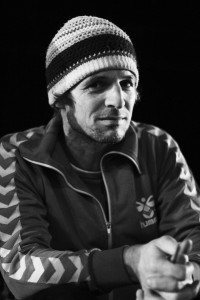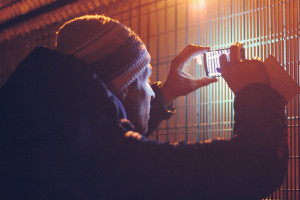Des citoyens sans étiquettes, d’ici ou d’ailleurs, pour mieux connaître les sociétés d’aujourd’hui. Par Sonia Johnson.
Tobias Müller is based in the Netherlands since 2006. He works as a freelance correspondent for printmedia in Germany, Switzerland, Austria & Luxembourg and for ARD (German TV) studio Brussels.
Tobias has a strong experience in journalism and has been covering the migrants crise in Europe in the most pacific and professional way possible. Interview.

Crédit: Tinka Kalajzic
S.J : Tobias, you have been reporting in Calais for many years now, each time you try to better understand the immigrants individual situation. You have been a regular witness to this disaster that has no borders, why did you choose this subject?
Tobias Müller : As a freelancer, you always choose your own issues to a certain extent. I cover a lot of migration stories in general, down to personal interest, political outlook and as I think it is a very basic, fundamental question. It is not only Calais that I cover, but also places like Lampedusa, the Balkans, Milano Central Station or refugees hungerstrikes in Brussels. Calais plays a special role, though, because it has been going on for so long and conditions are extreme.
S.J : After spending hours in temporary camps and interviewing desperate migrants, what did you discover?
Tobias Müller : First, that it is nothing but a matter of sheer coincidence if you are allowed to cross a border legally by presenting your passport or in a clandestine way under conditions that are life threatening. Second, that anyone who has made it to Calais has shown more motivation and commitment to building a life in Europe than most native Europeans could ever fit into a resume. Third, despite the conclusion that (clandestine) migration is a complex political and economic system which involves way more aspects than ‘xenophobic border regime vs The Wretched of the Earth’, the Jungle remains a shame for humanity, or, as you put it, a disaster without borders.
S.J : On some occasions the jungle has been full of journalists, sometimes you’ve been alone to cover the story. Do you think the situation in Calais is an ongoing subject or is it just a short term news item?
Tobias Müller : For years, Calais only hit the major international news only when the jungle was evicted (2009) or migrants would try to break down fences in the port (except for the UK, that is). This actually has changed with last summers’ attempted mass break- ins at Eurotunnel, and by what we currently know as the refugee crisis. Rise and fall of media attention goes for any issue, so there’s nothing special about that one. Still, there is quite some underrepresented aspects to Calais, as the amount of police violence and the recent activities of local racist or identitarian militias.
S.J : With your skateboard, your rucksack on your back, a note book and a pen, are these your ‘perfect outfit’, your essential items to explore the ‘Calais jungle?’
Tobias Müller : ‘Perfect outfit’ is a big word. It is more that actual conditions determine your outfit. That says I might end up with a big backpack in the jungle if I have to catch a train back later on the same day, although I’d prefer to be without. A skateboard is sure perfect to quickly move between far out places as the Jungle or the Eurotunnel.

Crédit: Tinka Kalajzic
S.J : Tobias, while you were in Calais the Eurotunnel was flooded to avoid migrants to cross, what did you observe here?
Tobias Müller : A big area under water, just behind the first fence near the tunnel entrance at Coquelles, extending for some 50 meters or more until the next line of fences. Since it was very cold the water was in the process of freezing with the icy surface reflecting the pale yellowish streetlights along the fence. Even though I was outside the fence, I was stopped every 5 minutes by gendarmerie patrols. They could not tell me how deep the water was. When I asked them whether the flooding would not pose a great danger to migrants, they said it was their own responsibility.
S.J : Could you tell us one of your best memories in “The Jungle”, something you will never forget.
Tobias Müller : Delicious dinner in the old Pashto jungle. Introducing skateboarding to a bunch of Afghan youths. And my photographer Alex Stein’s debut as an English teacher – although that one was in one of the former squats.
S.J : Thanks you Tobias.





